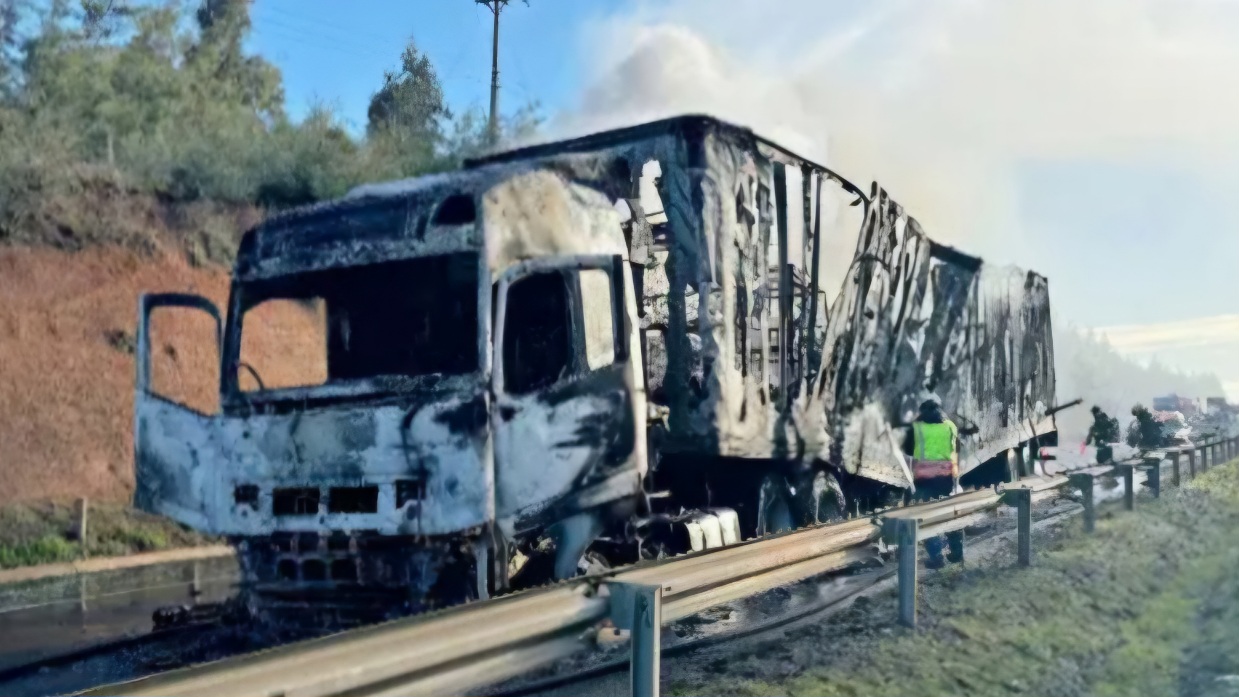For the first time in nearly 28 years of attacks in the southern macrozone, victims of violence have appealed to the United Nations (UN) Human Rights Committee. This involves 31 individuals affected since 2006 by multiple arson attacks, homicides, forced displacement, and other violent acts.
Combining all legal actions pursued in court, they have filed 223 complaints and criminal cases. Behind these cases, the prosecution system records no convictions.
The case was brought to the international stage by lawyer Pablo Urquizar, former security coordinator for the southern macrozone, who emphasizes that his clients have been "directly and severely affected by multiple acts of violence linked to the insecurity situation" in the south. He warns that "this long-standing issue has worsened in recent years due to the inaction of the Chilean State and the growing activity of radicalized organizations," such as the Arauco Malleco Coordinator (CAM) and the Mapuche Malleco Resistance, which the State has failed to dismantle. This scenario, he says, "has led to a series of human rights violations, protected both by national legislation and international treaties signed by Chile, such as the International Covenant on Civil and Political Rights."
Forestry contractor Yasna Navarrete is one of the victims included in the submission. She reveals she has suffered over 20 attacks. Of these, only one arrest has been recorded, and not a single conviction.
"We want the State to be compelled to acknowledge that terrorism exists here," says Navarrete. "With this, we are not seeking to blame any specific government, because for us, it is a state issue," she clarifies.
Navarrete adds that "throughout governments, both left and right, it has never been recognized that there are victims of terrorism in Chile."
"Exhausted all domestic remedies"
To appeal to this international body, Urquizar relied on the Optional Protocol to the International Covenant on Civil and Political Rights, explaining that "this instrument allows for individual communications to be submitted to the Human Rights Committee in cases of alleged violations" of fundamental rights. In this regard, he notes that Chile, as a State party since 1992, "recognizes the competence of this body to examine and rule on these matters."
The lawyer stresses that the complaint aims for the Committee to evaluate the State's conduct regarding both the International Covenant and norms contained in the Universal Declaration of Human Rights. He points out that it has been proven that "the affected parties have exhausted all available domestic remedies without obtaining justice or reparations, which enables the Committee's intervention."
Navarrete, meanwhile, justifies her appeal to this body due to the State's "inaction." "Terrorism has ruined our lives, it has stripped us of fundamental rights," she claims, emphasizing that "I would like to talk about the right to work, freedom of movement, because they block roads and prevent you from going where you need to; they deny you the chance to invest in machinery or anything else, because they burn it and hang up a sign."
A common factor among the victims is the sense of impunity they face, as none of the cases have resulted in a conviction, Urquizar states.
"The overwhelming majority of these cases have been dismissed or closed without effective results, leaving the victims deeply distrustful of institutions and feeling abandoned by the State," he says.
"Here there are women, elderly people, retirees, farmers, teachers, and workers of various trades, as well as Mapuche and non-Mapuche individuals, all of whom share having been subjected to violent acts since 2006 onward," he details. Among other aggressions, he cites homicides, arson, theft, land seizures, threats, and even forced displacement from their homes and communities.
Reparations and provision of treatment
Urquizar explains that among the specific requests in the complaint are to "order the State to align its legal framework with the international standards established in the International Covenant on Civil and Political Rights and other human rights treaties ratified by Chile"; as well as to "instruct the State to remove all obstacles (...) that maintain total impunity, and to initiate or reopen investigations necessary to identify, prosecute, and punish those responsible for the reported acts." He also calls to "order the free, prompt, and immediate provision of medical, psychological, or psychiatric treatment to victims who request it," and to "instruct the State to implement a comprehensive security strategy in areas affected by violence and terrorism to prevent and dismantle organized criminal groups."
Other points include "ordering the provision of scholarships at Chilean public institutions for the children of victims who request them"; "determining compensatory damages for the material and immaterial harm suffered by the 31 victims," and "establishing a reparations commission (...) to investigate cases of violence in the southern macrozone from 1997 to the present."
Source:El Mercurio







Comments (0)
No comments yet. Be the first to comment!
Leave a comment